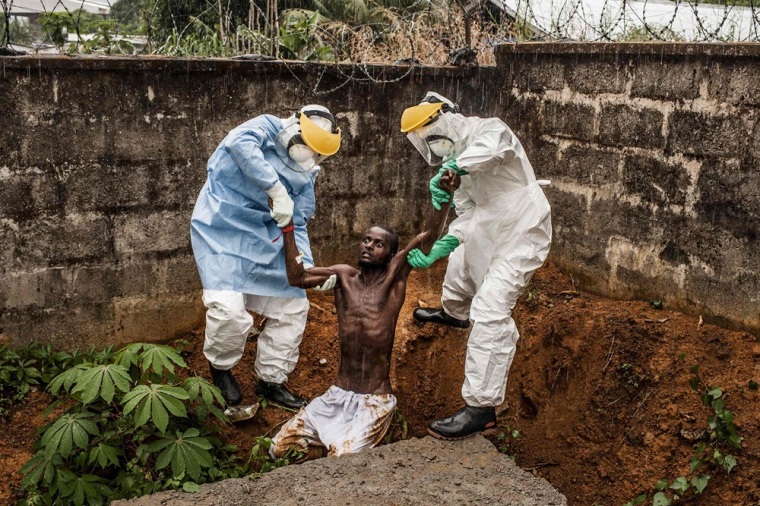Ebola Virus Outbreak News 2015: Ebola Still Alive in Body of Victim a Week After Death

Ebola can be contracted from bodies of the deceased infected with the virus for up to a week after their death, a study by the National Institutes of Health has revealed.
The study, published in a recent edition of the journal Emerging Infectious Diseases, sampled deceased Ebola-infected monkeys and found that the virus remained viable for at least seven days. Researchers also found infectious viral RNA for up to 70 days after death, according to the recently released N.I.H. study.
The study's findings emphasized the significance of exercising safe and sanitary practices in handling Ebola-infected corpses.
Scientists at the N.I.H. National Institute of Allergy and Infectious Diseases examined samples from five macaque monkeys infected with the virus from a previous research and euthanized after they showed signs of the disease.
Their bodies were placed in a special chamber that mimicked the hot and humid environmental conditions in West Africa.
Researchers examined seven different body surfaces and tissues from various internal organs in order to measure the concentrations of live Ebola virus and viral RNA. Live virus was detectable in surface swabs up to seven days after death and in tissue samples for up to three days.
Meanwhile, the virus' RNA was still found in some swabs and samples even 10 weeks after death.
"The scientists believe these findings are likely to be consistent for non-human primates such as gorillas and monkeys. In fact, they designed the study to test animals found dead in the wild, but shifted the timing and emphasis to human implications related to the ongoing West Africa Ebola outbreak," the N.I.H. said.
"This spells bad news for family members or close ones who have been exposed to the bodies of deceased loved ones who were infected with the virus," a CBS report said.
 Christians don't have to affirm transgenderism, but they can’t express that view at work: tribunal
Christians don't have to affirm transgenderism, but they can’t express that view at work: tribunal Archaeology discovery: Medieval Christian prayer beads found on Holy Island
Archaeology discovery: Medieval Christian prayer beads found on Holy Island Presbyterian Church in America votes to leave National Association of Evangelicals
Presbyterian Church in America votes to leave National Association of Evangelicals Over 50 killed in 'vile and satanic' attack at Nigerian church on Pentecost Sunday
Over 50 killed in 'vile and satanic' attack at Nigerian church on Pentecost Sunday Ukrainian Orthodox Church severs ties with Moscow over Patriarch Kirill's support for Putin's war
Ukrainian Orthodox Church severs ties with Moscow over Patriarch Kirill's support for Putin's war Islamic State kills 20 Nigerian Christians as revenge for US airstrike
Islamic State kills 20 Nigerian Christians as revenge for US airstrike Man who served 33 years in prison for murder leads inmates to Christ
Man who served 33 years in prison for murder leads inmates to Christ


 Nigerian student beaten to death, body burned over ‘blasphemous’ WhatsApp message
Nigerian student beaten to death, body burned over ‘blasphemous’ WhatsApp message 'A new low': World reacts after Hong Kong arrests 90-year-old Cardinal Joseph Zen
'A new low': World reacts after Hong Kong arrests 90-year-old Cardinal Joseph Zen Iran sentences Christian man to 10 years in prison for hosting house church worship gathering
Iran sentences Christian man to 10 years in prison for hosting house church worship gathering French Guyana: Pastor shot dead, church set on fire after meeting delegation of Evangelicals
French Guyana: Pastor shot dead, church set on fire after meeting delegation of Evangelicals ‘Talking Jesus’ report finds only 6% of UK adults identify as practicing Christians
‘Talking Jesus’ report finds only 6% of UK adults identify as practicing Christians Mission Eurasia ministry center blown up in Ukraine, hundreds of Bibles destroyed: 'God will provide'
Mission Eurasia ministry center blown up in Ukraine, hundreds of Bibles destroyed: 'God will provide' Church holds service for first time after ISIS desecrated it 8 years ago
Church holds service for first time after ISIS desecrated it 8 years ago Burger King apologizes for 'offensive campaign' using Jesus' words at the Last Supper
Burger King apologizes for 'offensive campaign' using Jesus' words at the Last Supper Uganda: Muslims abduct teacher, burn him inside mosque for praying in Christ’s name
Uganda: Muslims abduct teacher, burn him inside mosque for praying in Christ’s name